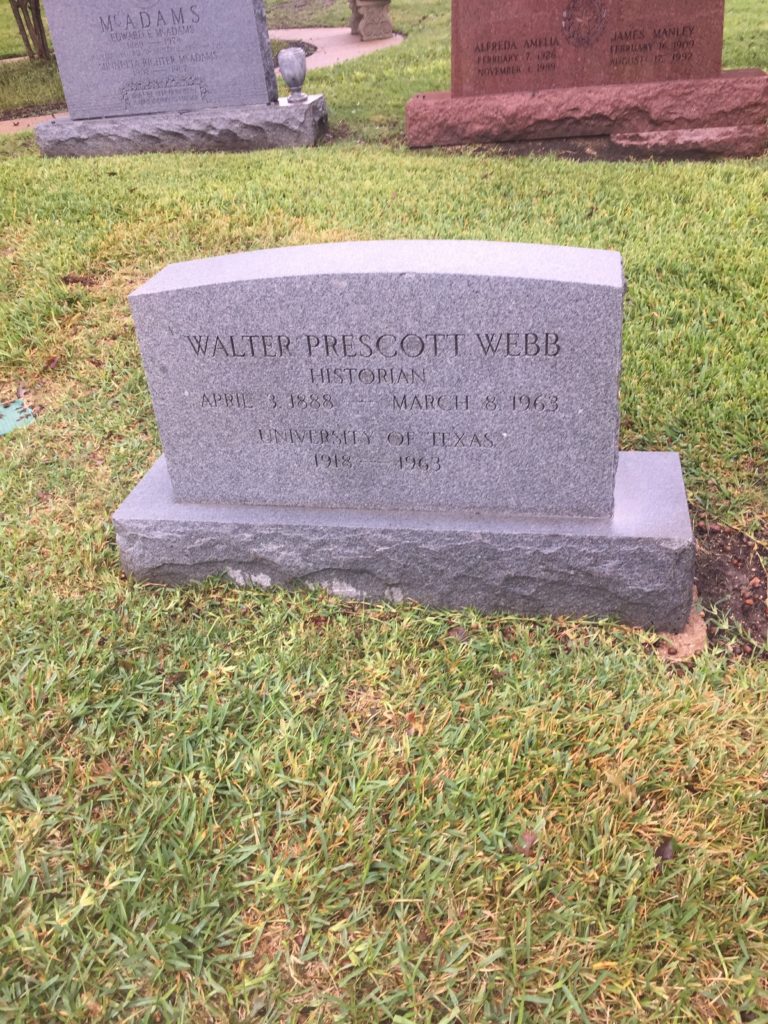Erik Visits an American Grave, Part 645
This is the grave of Walter Prescott Webb.

Born in 1888 in Panola County, Texas, he went to high school in Eastland County, taught at some high schools, then went to college at the University of Texas, where he graduated in 1915, at the age of 27. He spent a few years working lesser jobs around Texas, even as an ophthalmologist’s assistant. But in 1918, the University of Texas hired him to be a faculty member in History. While on faculty, he did graduate work, getting a Ph.D. at the University of Chicago. His dissertation was of the major historical works on the American West in the 1930s, The Great Plains, published in 1931. In fact, he published it before he earned the Ph.D., which came in 1932. This was heavily influenced by Frederick Jackson Turner’s frontier thesis and a story of brave pioneers overcoming harsh elements to survive.
Webb was more interested in the environment itself than most other historians of the time and was a sort of precursor to environmental history, a field that grew rapidly in the 1990s and 2000s. For Webb, the story was how the harsh environment shaped the lives of the people who lived there. He started in the sixteenth century but was primarily concerned with the nineteenth century white pioneers. He could certainly be ridiculous–his claim that white women went insane due to the isolation of the Plains is problematic to say the least. But he also tapped into the great love of 1930s culture for the frontier and its process. It’s hard to overestimate just how Turnerian the New Deal was. The writings of many different people involved in both politics and culture at the time shows a deep fascination and love of the frontier and the people who supposedly conquered the wilds. Of course, this vision had no place for Native peoples in it and it goes far to explain just how even progressive politics were extremely white-centric politics at this time. Anyway, Webb tapped into that paradigm with perhaps more influence that anyone else in his time.
Webb would go on to publish or coauthor about 20 books. These included The Texas Rangers in 1935 and More Water for Texas in 1954, which explored the great and continuing crisis for his home state getting the water supplies it needed to grow. In that he criticized the U.S. drive to water the dry lands of the region, which he also wrote about publicly, such as in a 1957 Harper’s article that received a lot of attention. In 1958, Webb was the president of the American Historical Association. You can read his presidential address here if you want a brief glimpse into his ideas. Webb died in 1963, at the age of 74.
Walter Prescott Webb is buried in Texas State Cemetery, Austin, Texas.
This grave visit was supported by LGM reader donations. Many thanks! If you would like this series to visit other presidents of the AHA, and I know how exciting historian graves are to all of you, you can donate to cover the required expenses here. Allan Nevins, the historian of nineteenth century American politics and the 1959 president, is in Valhalla, New York, while Lynn Thorndike, a medievalist who was the 1955 president, is in Newport, Maine. Previous posts in this series are archived here.


